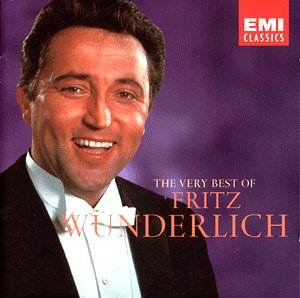Wunderlich made his stage debut as Tamino, in a student production
in 1954, and by a cyclical coincidence it was his last role, sung
with the Stuttgart Opera at the Edinburgh Festival in August 1966.
After those appearances he returned to his native Germany to holiday
at the hunting lodge of a colleague, the bass Gottlob Frick. Whilst
going to answer a ’phone call he slipped, fell downstairs and
was taken to hospital unconscious; he never recovered. Thus ended
the career of certainly the greatest German lyric tenor of the
post-Second World War years; he was two weeks short of his 36th
birthday. At this stage of his career he was about to expand more
extensively into the Italian lyric roles and was preparing the
role of Rodolfo at the time of his death. Whilst Caruso and Björling
died prematurely at 49, we at least have records of them in their
full vocal maturity. We will never know where Wunderlich’s vocal
development would have taken him particularly in the German repertoire;
certainly a Walther, and perhaps a Lohengrin or Parsifal, as successor
Siegfried Jerusalem, a distinguished Tamino in Haitink’s recording,
has done.
We are fortunate that Wunderlich left an generous recorded legacy.
He recorded extensively for Electrola, the autonomous German branch
of EMI, DG and various radio stations that have also been a source
of issued CDs (see my review of the singer on the Hänssler
Classic label elsewhere on this site). As was the habit in the
1950s and 1960s most of his operatic offerings on record are in
the singer’s native German rather than the language of the work’s
composition. Of the non-Germanic works on this double disc issue
only Handel’s ‘Largo’ is sung as set (CD1 tr.6). I recognize that
for many purists this will constitute a significant drawback.
Nonetheless, I strongly recommend persistence because the virtues,
particularly the beauty of tone, the elegance of phrasing and
vocal characterising of the singer outweigh that disadvantage,
and this pair of discs deserves a place in the collection of any
lover of fine singing. The matter of language is put in perspective
in the first two items, Don Ottavio’s ‘Il mio tesoro’ and ‘Dalla
sua pace’ (using the Italian original as shown on the back of
the jewel case) from Don Giovanni. The smooth legato and the beauty
of the timbre trick the ear into hearing Italian! Not possible
in reality of course, but it is the clue to the artistry of this
fine singer that one can suspend belief of what is filling ones
aural perception. Much the same can be said about the French and
Italian items that start the second CD. In the former, Wunderlich
adopts a slight nasality to the tone and a honeyed ‘mezza voce’
that make the last phrase ‘Manon’ (tr.2) heart-rending in its
sensitivity. Similar artistry is to be heard in the diminuendo
with which he concludes ‘Quanto e bella’ (tr.4).
The recordings on these discs were made between 1960 and 1964
when Wunderlich was firmly established. His early reputation in
Mozart is well illustrated by his Ferrando, Belmonte and Tamino’s
‘Die Bildnis’ (CD 1 tr.3-5) as well as in the Don Giovanni arias
referred to. His voice has an even production across its range,
an edge of steel to the silvery tone enables the singer to give
bite and characterization to his singing. Electrola readily recognized
this skill and the extracts here of his Fenton, from Nicolai’s
Shakespearian opera, sublimely conducted by Heger (CD1 tr.12-13)’,
and as Jenick in Smetana’s ‘Bartered Bride’ (CD1 tr.14-15, and
shown only by the German name) exemplify this. Wunderlich was
not a good actor on stage but as these examples, and the earlier
ones from the French and Italian repertoire, show he could convey
both the character and the meaning of the words, to near perfection,
by vocal means alone; a skill not given to many operatic singers.
Elsewhere on these discs there are extracts from operetta, of
which he was fond of recording but not singing on stage! Sample
his Lehár (CD 2 tr.9-12), particularly tr.12 ‘Wolgalied’;
you will immediately think of Tauber, there can be no higher compliment
in this repertoire. Significantly, from the vocal point of view,
he removes the steel from his voice and the wholly appropriate
honeyed tone prevails; true artistry indeed.
Wunderlich was not a great lieder singer, but he did contribute
superb renditions of the tenor songs on Klemperer’s EMI ‘Das Lied
von der Erde’ and perhaps space for a memory of that should have
been found here. There are differences of acoustic between some
of the 1960 recordings, where the voice is forward and the acoustic
on the dry side, to other later recordings where there is more
resonance and the voice set further back. The difference is notable
but did not detract from my enjoyment. The sleeve note, in English,
German and French is sparse and is thankfully printed in white
on purple/indigo, better than the orange of the composer’s names!
CD1 tr.8 is by Wagner, its attribution is missing; sloppy!
Robert J Farr




